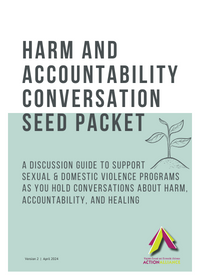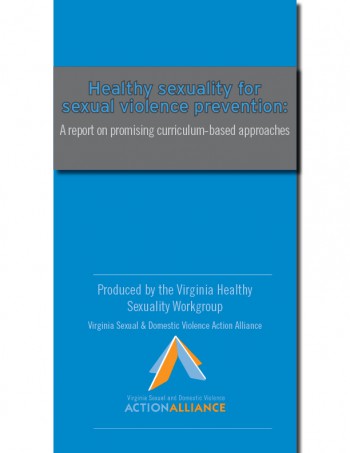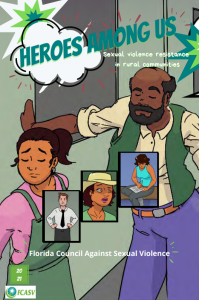Start a Search:
Author: Action Alliance
Harm and Accountability Conversation Seed Packet: A Discussion Guide to Support Sexual & Domestic Violence Programs as You Hold Conversations About Harm, Accountability, and Healing

The Harm and Accountability Conversation Seed Packet is a guide to help people working in sexual and domestic violence programs begin to think more broadly about what accountability can and should look like, not only after harm is committed, but also in all aspects of their lives: our relationships, families, workplaces, and communities.
The 95-page document includes 17 exercises and concrete steps for folks working in sexual and domestic violence agencies who want to expand their knowledge and practice of effective accountability.
Examples of activities in the discussion guide include:
• Responding to harm caused by individuals vs. systems
• How shame can block accountability
• What is the “victim/perpetrator binary” and how does it impede our work?
• Accountability and punishment Venn diagram
• What are the obstacles to accountability and how to overcome them?
• How to give a genuine apology
• Healing and accountability wheel
The discussion guide is designed to be a toolkit for holding conversations in your workplace, communities, and families. It was written to spark discussions about what paths exist for promoting accountability and how we can practice it in our own lives to model it for our friends, families, coworkers, and communities.
The guide asks us to consider what systems for supporting accountability currently exist, and to imagine new ways of approaching our responses to harm…approaches that not only reinforce accountability but also strengthen connection and healing.
Health Issues Affecting Trafficked Individuals
Summarizes the health issues affecting trafficked individuals. Includes information on these topics:
Considerations about status and legal proceedings: How individuals and their health problems are treated will depend on where arrested trafficked individuals are located and what kind of evidence is required for legal proceedings.
Health Problems: Health problems affecting trafficked individuals forced into commercial sex work and/or involuntary labor can be contracted because of the conditions in unsafe immigration routes utilized by traffickers and those in sending or receiving countries. Socio-economic determinants like substandard housing, illiteracy, racism, etc., affect health and access to healthcare.
Complex Traumas and Oppressions
Healthcare Providers
Medical Records and Care
Healthy Sexuality for Sexual Violence Prevention: A Report on Promising Curriculum-Based Approaches

A distillation of and report on the top curriculum-based healthy sexuality programs. Produced by Virginia’s Healthy Sexuality Workgroup, which is charged with finding links between primary sexual violence prevention and sexual health promotion, determining each field’s evidence base, and discussing how to best deliver the vital information offered by both fields to youth in Virginia.
Published by Virginia Sexual & Domestic Violence Action Alliance. 2011
12 pages.
Heroes Among Us Comic Book

The Florida Council Against Sexual Violence developed a creative tool for Latinx communities in rural areas while adhering to the social distance recommendations issued by health experts due to COVID-19.
You can also review a short recorded video webinar explaining what it is and providing more information about how people might use it. You can access the recording here.
Highlights from the Revised FVPSA Regulations for Advocates and Programs Serving LGBTQ Survivors
Revised rules and regulations regarding the FVPSA program have taken effect.
The Family Violence Prevention and Services Act program provides federal funds to states for distribution to DV and SA programs. Most DV programs receiving state funds also receive FVPSA funds. The FVPSA regulations set forth important parameters, limits and requirements for FVPSA funded programs. These regulations impact survivors on a day to day level.
FVPSA program office undertook a careful and collaborative process of updating regulations to reflect what the field has learned about the needs and realities of DV survivors as well as the DV movement’s and Federal Government’s commitment to meaningful and accessible services for DV survivors and their children.
Changes include improvements and clarifications related to access to DV advocacy and shelter for LGBTQ survivors.

